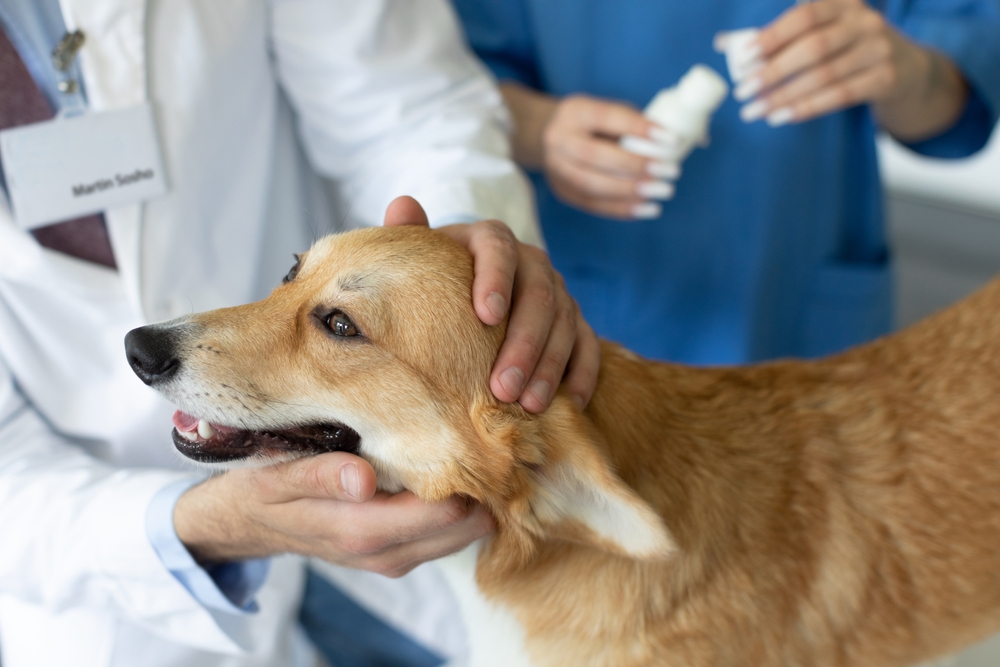Following your pet’s surgery, carefully following these instructions is essential for a smooth recovery and minimizing complications.
Post-Surgery Care Instructions for Your Pet
Post-Anesthesia Effects
- Lethargy: Your pet may seem more tired than usual. This is a normal effect of anesthesia and should subside within 24 hours.
- Coughing: A mild cough for 1–2 days is common due to the use of an endotracheal tube during surgery.
- Bowel Movements: It’s normal for defecation to be delayed for a few days because of fasting and the anesthetics.
- Increased Urination: Your pet may urinate more frequently on the first day due to IV fluids administered during surgery.
Feeding Instructions
- Some pets may experience carsickness on the way home.
- Once home, keep your pet in a warm, dry place and offer a small meal (up to half their usual portion).
- Regular feeding can resume the following day.
- A decreased appetite is normal for the first day. If your pet isn’t eating or drinking within 24 hours, contact us.
- Ensure fresh water is always available.
Activity Restrictions
- Activity should be limited after surgery, depending on your veterinarian’s specific instructions. Restrictions may include avoiding running, jumping, climbing, swimming, and stairs.
- Follow your veterinarian’s guidance on the duration of restricted activity.
Caring for the Incision
- Keep the incision clean and dry to prevent infection. If it becomes dirty, gently clean it with sterile saline solution—otherwise, leave it untouched. Avoid applying topical medications unless instructed.
- Monitor the incision daily for 10–14 days for signs of swelling, redness, discharge, pus, heat, foul odor, or loose sutures/staples.
- Minor bloody discharge on the first day is normal. However, contact us immediately if there is significant bleeding.
E-Collar Use
- Use an Elizabethan collar (e-collar) to prevent your pet from licking the incision, as this can lead to infection. The collar should remain on at all times.
Bandage or Splint Care
- Keep any bandage or splint clean, dry, and intact.
- Use a heavy plastic bag or a MediPaw Protective Boot when your pet is outside, removing it indoors.
- If the bandage becomes wet, dirty, loose, or emits a foul odor, call us immediately, as a sore may be developing underneath.
Medications
- Follow the prescribed medication schedule exactly and complete the entire course.
- Pain medications are often necessary. Watch for signs of discomfort, such as panting, restlessness, vocalizing, or hiding (common in cats).
- If you miss a dose, do not double the next dose—resume the regular schedule.
- Avoid giving any unapproved medications or supplements, as some can be harmful.
- Use gloves when handling medications that may be toxic to humans, and keep pet medications separate from human medications.
- Pill Pockets can make administering medication easier and more enjoyable for your pet.
When to Contact Us
Seek immediate attention if you notice any of the following:
- Bleeding from the surgical site
- White gums
- A temperature over 104°F
- Depression or unresponsive behavior
- Redness, swelling, or discharge around the incision, as this may indicate infection

Contact Us
If you have any questions or concerns, please don’t hesitate to reach out. We’re here to help ensure your pet’s recovery is smooth and comfortable!
Thank you for choosing us for your pet’s dental care. If you have any questions or concerns, please don’t hesitate to reach out to us at 916-359-9996 or via email at petlovevh@gmail.com.
We’re here to help ensure your pet’s health and comfort!
Contact Us
